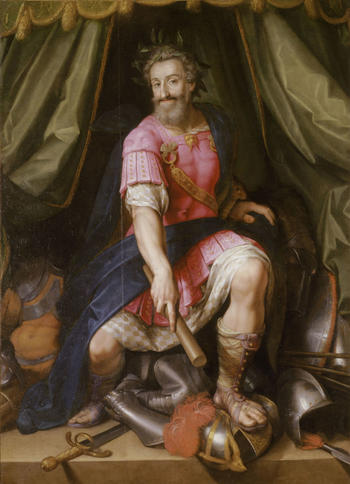Subproject 03
Mars and his Pistol. Contemporary Novelty and Epic Tradition in Early Modern France
Prof. Dr. Bernhard Huß (Institute of Romance Languages and Literatures, Freie Universität Berlin)
The subproject examines a corpus of epic texts in French and Latin from the 16th and 17th centuries. All of these texts employ the established conventions of the classical epic tradition, while simultaneously dealing with highly contemporary issues: each of them textualizes actual historical events which date back a hundred years at most, and sometimes only a few months (Aktualitätsepik). The corpus of primary texts includes, among others: the Henriades, a series of epics on Henri IV authored by Sebastien Garnier (1593/94) and Jean Le Blanc (1604), inter alios; the Lutetias (1617) by Paulus Thomas the Elder, another work whose main concern lies with Henri IV’s rise to power and French history from 1584 to 1590; the historical-cum-chronicle-style epic La Cité du Montélimar (1591) by Alexandre de Pontaymeri; the epic fragment La France divisée (c. 1594) by Pierre Boton, a critical synopsis of the political situation in late 16th-century France ravaged by civil war; the Borbonias (1623) by Abraham Remmius on the historical situation in the years between 1620 and 1622; and the Rupellais (1630) by Paulus Thomas the Younger on the struggle for La Rochelle in the 1620s. Further to this, epic texts from around 1500 – about, among other things, the campaigns of Louis XII in northern Italy – are analysed with a view to a comparison between epic forms of representation on the one hand, and 16th-century historiography with its evident affinity to the epic mode on the other hand. The project’s goal is to outline the generic profile of Aktualitätsepik with greater precision by examining the genre’s convergences and divergences with the contemporary discourse of practical historiography and historical theories concerning the writing of history. In so doing, the objective is to establish a clearer definition of the epic’s subject matter and methods of textualisation within its immediate temporal context. What is more, unravelling the complex entanglements of ‘old’ and ‘new’ in the individual epics elucidates the historical conceptions of the epic as a genre that inform these texts – texts, which deliberately select and perpetuate certain elements from the reservoir of epic tradition, while rejecting and discarding others. In how far do the historical primary texts in all their hybridity contribute to change within the conceptualisation of the epic that is taking place in contemporary theorisations of the genre? Speed, characteristics, epochal-discursive contingency and potential directionality of this change are important factors in this context. Of crucial importance to the project is the issue of reciprocal conditioning between the epic formularium and the historical situation depicted in the epics in question: the referencing of current events in epic texts influences and modifies the concrete form of literary potentialities and the generic options available; conversely, it also alters the perspective on actual historical events.
